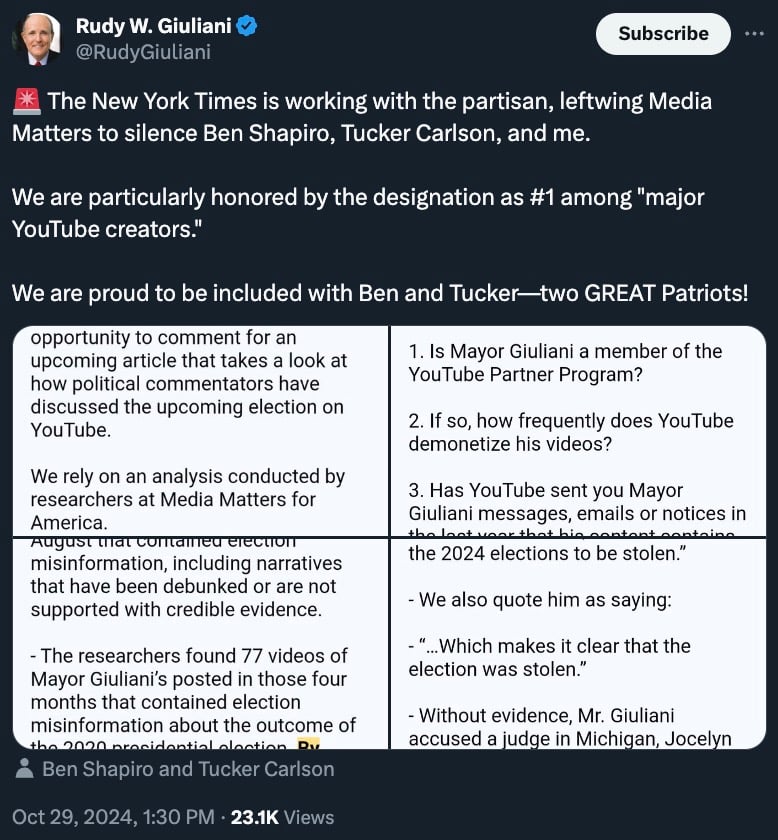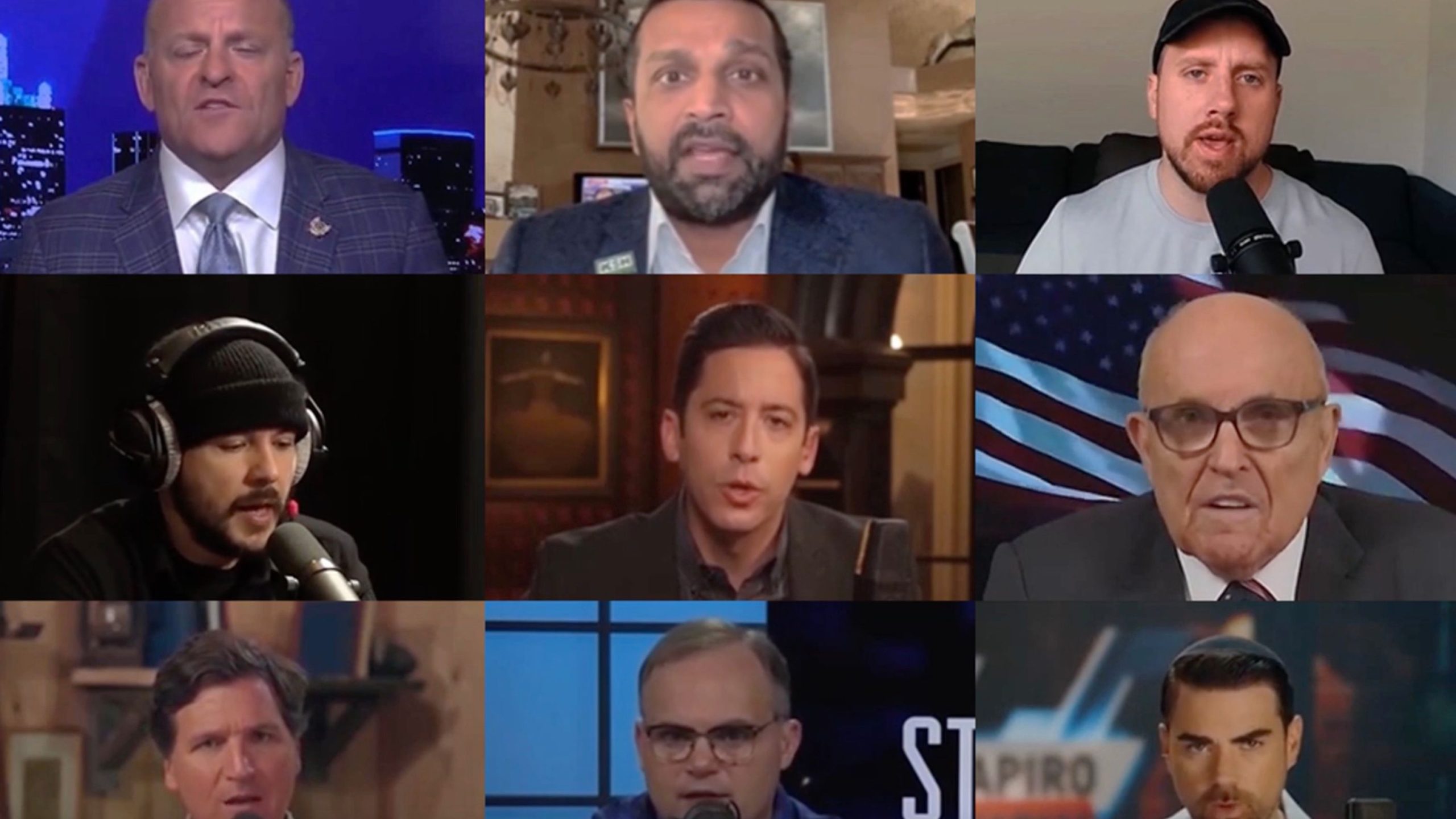The New York Times, Media Matters for America, and The Washington Post are stepping up their pressure on YouTube to demonetize and censor election “misinformation,” particularly statements that the 2020 election was rigged or insecure.
As these organizations push for stricter speech suppression, questions are raised about the implications for open discourse on the platform and the legacy media and activist attempts to get it shut down.
In the past months, Media Matters undertook an extensive review of content from 30 prominent conservative YouTube channels, identifying 286 videos containing what they classified as election misinformation, which collectively garnered over 47 million views. This report, backed by verification from The New York Times, pointed out that YouTube profited from ads placed on many of these videos.
Highlighted in the Times article were figures such as former New York Mayor Rudy Giuliani, Fox News host Tucker Carlson, and conservative commentator Ben Shapiro, all of whom have voiced skepticism regarding the legitimacy of various aspects of the 2020 election process.
According to The New York Times, “Giuliani, the former New York mayor, posted more false electoral claims to YouTube than any other major commentator in the research group.”
Surprisingly, YouTube’s stance, as relayed by a spokeswoman, stresses the importance of open political discourse: “The ability to openly debate political ideas, even those that are controversial, is an important value — especially in the midst of election season,” she stated, defending the platform’s approach to content management.
However, YouTube did still remove three of the videos that Media Matters flagged.
Critics argue that the concerted effort by The New York Times and Media Matters may push YouTube towards a censorship regime that could hinder the expression of political ideas and debates. They fear that these actions could set a precedent where content is excessively policed, potentially stifling a broad spectrum of political discussions under the guise of combating misinformation.
A YouTube spokesman elaborated on the company’s policy, saying, “YouTube said it removes videos that mislead voters on how to vote, encourage election interference or make violent threats.”
The discussion around these policies does not occur in a vacuum. Various community members and commentators have voiced their concerns. Giuliani, a popular YouTube creator mentioned in the article, defended his content, stating, “I am proud to be included with Ben and Tucker — two GREAT Patriots!”

The Washington Post in particular takes aim at podcasts. Podcasts, fundamentally different from other media formats in their distribution, exist primarily as MP3 files that are uploaded and stored on various hosting services before being disseminated across a multitude of directories and platforms. This more decentralized nature of podcast distribution means that unlike posts on a single platform like Facebook or Twitter, which can be centrally monitored and moderated, podcasts can be accessed from numerous sources. This dispersal complicates the ability of activists and tech companies to exert control over content, as removing a podcast from one directory does not prevent it from being available on others. Additionally, the host servers, often separate entities from the directories that list the podcasts, further obscure the line of responsibility and control, rendering censorship efforts fragmented.
The Washington Post also amplified Brookings Institution fellow Valerie Wirtschafter’s complaints that podcasts are challenging for tech companies and researchers to monitor. “The shows are an especially impactful vehicle for falsehoods and conspiracy theories because hosts foster intimate, trusted relationships with their listeners, who regularly tune in during their commutes or while doing chores around their homes,” she said.
“Fact-checking is so hard on social media,” said Katie Harbath, CEO of the tech consultancy Anchor Change and a former Facebook public policy director, to the Washington Post. “How do you even do that on a podcast?”
Conservative commentator Ben Shapiro has launched a scathing attack on mainstream media, particularly targeting The New York Times and The Washington Post for today’s publications which he claims attempt to suppress conservative media outlets. His criticism comes at a critical time, just days before voters head to the polls.
According to Shapiro, both The New York Times and The Washington Post released articles “just hours apart” in a coordinated effort to discredit conservative media. Shapiro disparages these pieces as “trash” and indicative of a broader media agenda to quell conservative discourse.
Shapiro specifically mentions his own commentary, stating, “The New York Times, of course, argues on the basis of Media Matters (!) ‘research’ that YouTube is essentially making money off election denialism.” He defends his statements as factual, particularly his claims about Democrats manipulating voting rules in 2020 to favor mail-in voting and ballot harvesting, arguing, “Which, of course, isn’t misinformation. It’s true.”
Shapiro also criticizes The Washington Post, which he feels exacerbates the issue by suggesting that podcasts are detrimental to American society. He expresses dismay at being singled out for “the sin” of hosting former President Donald Trump on his show, which The Post characterizes as problematic. Shapiro sarcastically remarks on the publication’s extreme stance: “Their conclusion? You guessed it: SHUT IT ALL DOWN.”
Shapiro’s critique extends beyond specific articles, touching on what he perceives as a broader attempt by the Democratic Party and its “apparatchiks” to control media narratives and stifle opposition. He ties these media criticisms to political motives, specifically attacking Vice President Kamala Harris and Minnesota Governor Tim Walz for allegedly wanting to shut down opposition media.
Established in 2004 by journalist and activist David Brock, who is described by Time magazine as “one of the most influential operatives in the Democratic Party,” Media Matters consistently targets what it perceives as conservative misinformation online and in the media.










